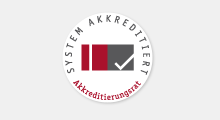Bücher
Die KI war's!

Autorin
Katharina Zweig
Jahr
2023
Zusammenfassung
Dass Algorithmen über Menschen und deren Zukunft entscheiden, scheint unausweichlich zu sein – wir alle sind längst den Urteilen von Künstlicher Intelligenz ausgesetzt: Immer mehr Firmen lassen Bewerbungen automatisiert bewerten, und immer mehr Menschen bekommen Bescheide oder Auskünfte, die durch Maschinen vorbereitet wurden. Doch nicht alle diese algorithmisch getroffenen Entscheidungen sind korrekt, es gibt immer wieder Fälle, in denen KI diskriminiert, Unschuldige eines Verbrechens beschuldigt oder gar Leben gefährdet. Katharina Zweig, vielfach ausgezeichnete Informatikprofessorin, erklärt unterhaltsam und anhand spannender aktueller Fälle, wie wir falsche Entscheidungen erkennen und uns dagegen wehren können. Denn wir sollten wissen, worauf wir achten müssen, damit Algorithmen nach unseren Regeln spielen und nicht nach ihren eigenen.
Wissenswertes
Spiegel Bestseller
Awkward Intelligence
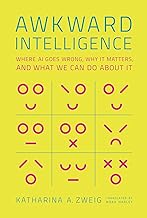
Autorin
Katharina Zweig
Jahr
2022
Zusammenfassung
Before we know it, artificial intelligence (AI) will work its way into every corner of our lives, making decisions about, with, and for us. Is this a good thing? There’s a tendency to think that machines can be more “objective” than humans—can make better decisions about job applicants, for example, or risk assessments. In Awkward Intelligence, AI expert Katharina Zweig offers readers the inside story, explaining how many levers computer and data scientists must pull for AI’s supposedly objective decision making. She presents the good and the bad: AI is good at processing vast quantities of data that humans cannot—but it’s bad at making judgments about people.
Sozioinformatik - Ein neuer Blick auf Informatik und Gesellschaft
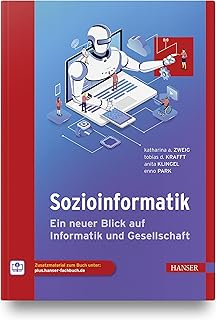
Autorin
Katharina Zweig, Tobias Krafft, Anita Klingel, Enno Park
Jahr
2021
Zusammenfassung
"Sozioinformatik" bietet eine Einführung in die Modellierung und Analyse von digitalen Technologien und eine neue Methodik zur Technikfolgenabschätzung anhand von realen gesellschaftlichen Beispielen.
Wissenswertes
Das Buch ist das Lehrbuch des Kurses "Einführung in die Sozioinformatik", s. hier.
Ein Algorithmus hat kein Taktgefühl
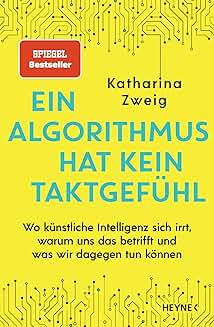
Autorin
Katharina Zweig
Jahr
2019
Zusammenfassung
Künstliche Intelligenz und Algorithmen erleichtern in Form von Navis, Rechtschreibprogrammen, Suchergänzungen oder Kaufempfehlungen schon lange unseren Alltag. Aber sie hinterlassen oft auch ein mulmiges Gefühl, weil wir nicht so recht verstehen, was da passiert. Katharina Zweig, IT-Expertin für Sozioinformatik und vielfach ausgezeichnete Informatikprofessorin, erklärt mit Witz und anhand einfacher Beispiele und Illustrationen, was Algorithmen eigentlich genau sind, wie sie funktionieren, welche völlig harmlos sind und welche uns tatsächlich Sorgen bereiten sollten. Damit wir wissen, worauf wir achten müssen, wo wir uns einmischen und Politik und Wirtschaft genauer auf die Finger schauen müssen, wenn wir diese Technik in menschlicher Hand behalten, ihre positiven Eigenschaften nutzen und die negativen kontrollieren wollen.
Wissenswertes
Dieses Buch stand für 11 Wochen in der Spiegel-Bestsellerliste Paperback Sachbuch.
Network Analysis Literacy

Autorin
Katharina Zweig
Jahr
2016
Zusammenfassung
This book presents a perspective of network analysis as a tool to find and quantify significant structures in the interaction patterns between different types of entities. Moreover, network analysis provides the basic means to relate these structures to properties of the entities. It has proven itself to be useful for the analysis of biological and social networks, but also for networks describing complex systems in economy, psychology, geography, and various other fields. Today, network analysis packages in the open-source platform R and other open-source software projects enable scientists from all fields to quickly apply network analytic methods to their data sets. Altogether, these applications offer such a wealth of network analytic methods that it can be overwhelming for someone just entering this field. This book provides a road map through this jungle of network analytic methods, offers advice on how to pick the best method for a given network analytic project, and how to avoid common pitfalls. It introduces the methods which are most often used to analyze complex networks, e.g., different global network measures, types of random graph models, centrality indices, and networks motifs. In addition to introducing these methods, the central focus is on network analysis literacy – the competence to decide when to use which of these methods for which type of question. Furthermore, the book intends to increase the reader's competence to read original literature on network analysis by providing a glossary and intensive translation of formal notation and mathematical symbols in everyday speech. Different aspects of network analysis literacy – understanding formal definitions, programming tasks, or the analysis of structural measures and their interpretation – are deepened in various exercises with provided solutions. This text is an excellent, if not the best starting point for all scientists who want to harness the power of network analysis for their field of expertise.
Entertainment Computing and Serious Games

Herausgeber
Ralf Dörner, Stefan Göbel, Michael Kickmeier-Rust, Maic Masuch, Katharina Zweig
Jahr
2015
Zusammenfassung
The aim of this book is to collect and to cluster research areas in the field of serious games and entertainment computing. It provides an introduction and gives guidance for the next generation of researchers in this field. The 18 papers presented in this volume, together with an introduction, are the outcome of a GI-Dagstuhl seminar which was held at Schloß Dagstuhl in July 2015.
Algorithmics of Large and Complex Networks
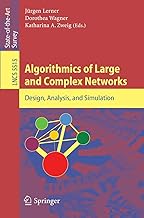
Herausgeber
Jürgen Lerner, Dorothea Wagner, Katharina Zweig
Jahr
2009
Zusammenfassung
Networks play a central role in today’s society, since many sectors employing information technology, such as communication, mobility, and transport - even social interactions and political activities - are based on and rely on networks.
In these times of globalization and the current global financial crisis with its complex and nearly incomprehensible entanglements of various structures and its huge effect on seemingly unrelated institutions and organizations, the need to
understand large networks, their complex structures, and the processes governing them is becoming more and more important.
This state-of-the-art survey reports on the progress made in selected areas of this important and growing field, thus helping to analyze existing large and complex networks and to design new and more efficient algorithms for solving various
problems on these networks since many of them have become so large and complex that classical algorithms are not sufficient anymore. This volume emerged from a research program funded by the German Research Foundation (DFG) consisting of projects
focusing on the design of new discrete algorithms for large and complex networks. The 18 papers included in the volume present the results of projects realized within the program and survey related work. They have been grouped into four parts:
network algorithms, traffic networks, communication networks, and network analysis and simulation.
2024
- Alexander Wilhelm and Katharina A. Zweig. Hacking a surrogate model approach to XAI
- Carl, K. Valerie and Hauer, Marc P. and Arnold, Thomas. Are We Still on Track with Our Responsibility Strategy? Introducing an Internal Assessment of Corporate Digital Responsibility Engagement In: INFORMATIK 2024. Gesellschaft für Informatik e.V.. S. 1573-1585.
- Krafft, Tobias D. Hauer, Marc P. Zweig, Katharina. Black-Box Testing and Auditing of Bias in ADM Systems In: Minds and Machines 34. S. 15
2023
- Marc P. Hauer and Tobias D Krafft and Andreas Sesing-Wagenpfeil and Katharina Zweig. Quantitative study about the estimated impact of the AI Act
- Hauer, Marc P. and Krafft, Tobias D. and Zweig, Katharina. Overview of transparency and inspectability mechanisms to achieve accountability of artificial intelligence systems In: Data & Policy S. e36.
- Hauer, Marc P. and Müller-Kress, Lena and Leimüller, Gertraud and Zweig, Katharina. Using Assurance Cases to assure the fulfillment of non-functional requirements of AI-based systems - Lessons learned In: 2023 IEEE International Conference on Software Testing, Verification and Validation Workshops (ICSTW). S. 172-179.
2022
- Chinazzo, André and De Schryver, Christian and Zweig, Katharina and Wehn, Norbert. Increasing the Sampling Efficiency for the Link Assessment Problem In: Algorithms for Big Data: DFG Priority Program 1736. Springer Nature Switzerland. S. 39-56.
- Chinazzo, André and Schryver, Christian De and Zweig, Katharina and Wehn, Norbert. A Custom Hardware Architecture for the Link Assessment Problem In: Algorithms for Big Data: DFG Priority Program 1736. Springer Nature Switzerland. S. 57-75.
- Stefan Strohmeier. Handbook of Research on Artificial Intelligence in Human Resource Management Edward Elgar Publishing. S. 323-336.
- König, Pascal D. and Krafft, Tobias D. and Wolfgang Schulz and Zweig, Katharina A.. Essence of AI: What Is AI? In: The Cambridge Handbook of Artificial Intelligence. S. 18-34.
- Krafft, Tobias D. and Zweig, Katharina A. and König, Pascal D.. How to regulate algorithmic decision-making: A framework of regulatory requirements for different applications S. 119-136.
- Hanna Hoffmann and Verena Vogt and Marc P. Hauer and Katharina Zweig. Fairness by awareness? On the inclusion of protected features in algorithmic decisions In: Computer Law & Security Review. S. 105658.
- Haeri, Maryam Amir Hartmann, Kathrin Sirsch, Jürgen Wenzelburger, Georg Zweig, Katharina A.. Promises and Pitfalls of Algorithm Use by State Authorities In: Philosophy & Technology. S. 33.
- Hanna Hoffmann, Verena Vogt, Marc P. Hauer, Katharina Zweig. Fairness by awareness? Zur Einbeziehung geschützter Merkmale in algorithmische Entscheidungen In: Information und Recht 87. (Künstliche Intelligenz - Ethik und Recht), 191-220, 2022.
- Johannes Kevekordes, Marc P. Hauer, Maryam Amir Haeri. Rechtliche Bewertung möglicher Fairnessmaße. In: Information und Recht 87. (Künstliche Intelligenz - Ethik und Recht), 141-190, 2022.
2021
- Krafft, Tobias D. and Reber, Martin and Krafft, Roman and Coutrier, Anna and Zweig, Katharina A.. Crucial Challenges in Large-Scale Black Box Analyses In: Advances in Bias and Fairness in Information Retrieval. Springer International Publishing. S. 143-155.
- Jöckel, Lisa and Bauer, Thomas and Kläs, Michael and Hauer, Marc P. and Groß, Janek. Towards a Common Testing Terminology for Software Engineering and Data Science Experts In: Product-Focused Software Process Improvement. Springer International Publishing. S. 281-289.
- Helfenstein, Mischa and Zweig, Katharina Anna and Herrlich, Marc. A Technical Framework for Investigating the Impact of Design Elements in the Wild: Using Instagram as an Example In: Proceedings of Mensch Und Computer 2021. Association for Computing Machinery. S. 490-493.
- Bernstein, Abraham and de Vreese, Claes and Helberger, Natali and Schulz, Wolfgang and Zweig, Katharina and Baden, Christian and Beam, Michael A. and Hauer, Marc P. and Heitz, Lucien and Jürgens, Pascal and Katzenbach, Christian and Kille, Benjamin and Klimkiewicz, Beate and Loosen, Wiebke and Moeller, Judith and Radanovic, Goran and Shani, Guy and Tintarev, Nava and Tolmeijer, Suzanne and van Atteveldt, Wouter and Vrijenhoek, Sanne and Zueger, Theresa. Diversity in News Recommendation (Dagstuhl Perspectives Workshop 19482) In: Dagstuhl Manifestos. Schloss Dagstuhl - Leibniz-Zentrum für Informatik. S. 43-61
- Hauer, Marc P. and Adler, Rasmus and Zweig, Katharina. Assuring Fairness of Algorithmic Decision Making In: 2021 IEEE International Conference on Software Testing, Verification and Validation Workshops (ICSTW). S. 110-113.
- Marc P. Hauer and Johannes Kevekordes and Maryam Amir Haeri. Legal perspective on possible fairness measures - A legal discussion using the example of hiring decisions In: Computer Law & Security Review. S. 105583.
- Pascal D. König and Tobias D. Krafft and. Evaluating the evidence in algorithmic evidence-based decision-making: the case of US pretrial risk assessment tools Current Issues in Criminal Justice. S. 359-381.
- Bockholt, Mareike Zweig, Katharina A.. A systematic evaluation of assumptions in centrality measures by empirical flow data In: Social Network Analysis and Mining. S. 25.
2020
- Bockholt, Mareike and Zweig, Katharina A.. Why We Need a Process-Driven Network Analysis In: Complex Networks and Their Applications VIII. Springer International Publishing. S. 81-93.
- Krafft, Tobias D. and Hauer, Marc P. and Zweig, Katharina A.. Why Do We Need to Be Bots? What Prevents Society from Detecting Biases in Recommendation Systems In: Bias and Social Aspects in Search and Recommendation. Springer International Publishing. S. 27-34.
- Abraham Bernstein and Claes H de Vreese and Natali Helberger and Wolfgang Schulz and Katharina A Zweig. Diversity, Fairness, and Data-Driven Personalization in (News) Recommender System (Dagstuhl Perspectives Workshop 19482) In: Dagstuhl Manifestos. Schloss Dagstuhl - Leibniz-Zentrum für Informatik. S. 117-124.
- Adam Harkens and Karen Yeung and Julia Felfeli and Anja Achtziger and Pascal Koenig and Tobias Krafft and Wolfgang Schulz and Georg Wenzelburger and Katharina Zweig. The rise of AI-based decision-making tools in the criminal justice system: implications for judicial integrity
- Reber, Martin and Krafft, Tobias D. and Krafft, Roman and Zweig, Katharina A. and Couturier, Anna. Data Donations for Mapping Risk in Google Search of Health Queries: A case study of unproven stem cell treatments in SEM In: 2020 IEEE Symposium Series on Computational Intelligence (SSCI). S. 2985-2992.
- Haeri, Maryam Amir and Zweig, Katharina Anna. The Crucial Role of Sensitive Attributes in Fair Classification In: 2020 IEEE Symposium Series on Computational Intelligence (SSCI). S. 2993-3002.
- Hauer, Marc P. Hofmann, Xavier C. R. Krafft, Tobias D. Zweig, Katharina A.. Quantitative analysis of automatic performance evaluation systems based on the h-index In: Scientometrics. S. 735-751.
- Bockholt, Mareike Zweig, Katharina Anna. Towards a process-driven network analysis In: Applied Network Science. S. 56
- Anita Klingel, Tobias D Krafft, Katharina Zweig. Mögliche Best-Practice-Ansätze beim Einsatz eines algorithmischen Entscheidungsunterstützungssystems am Beispiel des AMS-Algorithmus. In: Markus Hengstschläger (editor), Digital Transformation and Ethics, pages 190–215. Ecowin, Elsbethen, 2020.
- Tobias D Krafft, Katharina Zweig. Herausforderungen bei der Nutzung von KI in militärischen Anwendungsgebieten - Sozioinformatische Perspektive. In: Matthias Rogg, Sophie Scheidt, Hartwig von Schubert (editors), Ethische Herausforderungen digitalen Wandels in bewaffneten Konflikten, pages 55–66. German Institute for Defence and Strategic Studies, Hamburg, 2020.
2019
- Abufouda, Mohammed and Zweig, Katharina Anna. Link Classification and Tie Strength Ranking in Online Social Networks with Exogenous Interaction Networks In: Behavioral Analytics in Social and Ubiquitous Environments. Springer International Publishing. S. 1-27.
- Zweig, Katharina. Friedkin (1983): Horizons of Observability and Limits of Informal Control in Organizations In: Schlüsselwerke der Netzwerkforschung. Springer Fachmedien Wiesbaden. S. 213-215.
- Zweig, Katharina Anna. Milo et al. (2002): Network Motifs: Simple Building Blocks of Complex Networks In: Schlüsselwerke der Netzwerkforschung. Springer Fachmedien Wiesbaden. S. 411-413.
- Zweig, Katharina A. and Lachmann, Bernd and Montag, Christian and Herrlich, Marc. Kontinuierliches A/B-Testing zur Optimierung von Spielerbindung und Monetarisierung bei "Freemium"-Spielen In: Paradoxien des Verbraucherverhaltens: Dokumentation der Jahreskonferenz 2017 des Netzwerks Verbraucherforschung. Springer Fachmedien Wiesbaden. S. 43-57.
- Tom Hanika and Marek Herde and Jochen Kuhn and Jan Marco Leimeister and Paul Lukowicz and Sarah Oeste-Reiß and Albrecht Schmidt and Bernhard Sick and Gerd Stumme and Sven Tomforde and Katharina Anna Zweig. Collaborative Interactive Learning - A clarification of terms and a differentiation from other research fields
- Montag, Christian and Lachmann, Bernd and Herrlich, Marc and Zweig, Katharina. Addictive Features of Social Media/Messenger Platforms and Freemium Games against the Background of Psychological and Economic Theories In: International journal of environmental research and public health. S. 2612.
- Krafft, Tobias D. and Gamer, Michael and Zweig, Katharina A.. What did you see? A study to measure personalization in Google's search engine In: EPJ Data Science. S. 38.
2018
- Bockholt, Mareike and Zweig, Katharina A.. Process-Driven Betweenness Centrality Measures In: Network Intelligence Meets User Centered Social Media Networks. Springer International Publishing. S. 17-33.
- Tobias D. Krafft and Michael Gamer and Katharina A. Zweig. What did you see? Personalization, regionalization and the question of the filter bubble in Google's search engine
- Bockholt, Mareike and Peters, Olaf and Narciss, Susanne and Zweig, Katharina A. Analysis of human problems solving drafts: a methodological approach on the example of Rush Hour In: Proceedings of the annual meeting of the cognitive science society.
- Calma, Adrian and Kuhn, Jochen and Leimeister, Jan Marco and Lukowicz, Paul and Oeste-Reiss, Sarah and Schmidt, Albrecht and Sick, Bernhard and Stumme, Gerd and Tomforde, Sven and Zweig, Anna Katharina. A Concept for Productivity Tracking based on Collaborative Interactive Learning Techniques In: ARCS Workshop 2018; 31th International Conference on Architecture of Computing Systems. S. 1-8.
- Brugger, Christian and Grigorovici, Valentin and Jung, Matthias and De Schryver, Christian and Weis, Christian and Wehn, Norbert and Zweig, Katharina Anna. A Memory Centric Architecture of the Link Assessment Algorithm in Large Graphs In: IEEE Design and Test. S. 7-15.
- Krafft, Tobias D. and Zweig, Katharina A.. Wie Gesellschaft algorithmischen Entscheidungen auf den Zahn fühlen kann In: (Un)berechenbar? Algorithmen und Automatisierung in Staat und Gesellschaft. Fraunhofer-Institut für Offene Kommunikationssysteme FOKUS, Kompetenzzentrum öffentliche IT (öFIT). S. 471-492.
- Zweig, Katharina A. and Krafft, Tobias D.. Fairness und Qualität algorithmischer Entscheidungen In: (Un)berechenbar? Algorithmen und Automatisierung in Staat und Gesellschaft. Fraunhofer-Institut für Offene Kommunikationssysteme FOKUS, Kompetenzzentrum öffentliche IT (öFIT). S. 204-227.
- Sick, Bernhard Oeste-Reiß, Sarah Schmidt, Albrecht Tomforde, Sven Zweig, Anna Katharina. Collaborative Interactive Learning In: Informatik-Spektrum. S. 52-55.
- Zweig, Katharina A. Wenzelburger, Georg Krafft, Tobias D.. On Chances and Risks of Security Related Algorithmic Decision Making Systems In: European Journal for Security Research. S. 181-203.


![[Logo des FB Informatik]](/logos/logo_fbi_167x60.png)




